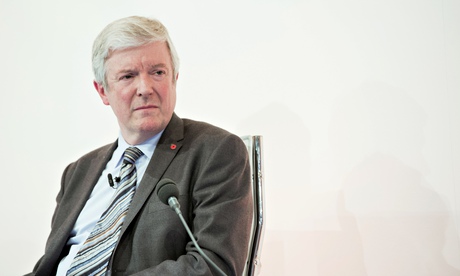
Tony Hall, the director general of the BBC, has pledged to ensure that last week’s hasty deal with government to secure stable funding for the corporation will never happen again.
Writing for the Observer, Lord Hall, who has been forced to accept responsibility for the £750m cost of free licence fees for the over-75s, argues that key negotiations about the financial basis of the BBC must now be taken out of the political arena for good.
Despite the gains he believes he eventually made after “intense” discussions with the Department of Culture, Media and Sport, Hall admits that “although the BBC used this pre-budget window of opportunity to reach a fair deal, it is not a process we would have chosen and it is not a process that should be repeated”.
The upcoming charter renewal process, in which the funding and core activities of the BBC are to be scrutinised, is the time to build a necessary wall between party politics and the changing remit of the corporation, Hall suggests. “I believe that for future negotiations the debate about the BBC’s scale and funding should be taken out of the political cycle,” he writes.
In other countries, such as Germany, an independent panel decides on broadcast funding. An alternative, now the British parliament has fixed terms, would be to schedule talks at a distance from election campaigns. Hall is thought to want such ideas considered during charter renewal deliberations.
Reacting to a widespread view that the surprise government agreement has undermined the independence of the BBC and made it vulnerable to further cuts, Hall said he wanted to reassure the public. “There has been no fundamental change in the relationship between government and corporation. Nor will there ever be under my watch,” he writes, adding: “Our independence is precious and will never be negotiated away.”
His words are intended to answer criticism from those who agree with the former Labour culture secretary Ben Bradshaw, who argued last week that the BBC is now in effect “a branch of the Department for Work and Pensions”.
The director general also issues a loud rallying cry to supporters of the BBC. “We should be under no illusion that this is a period of high risk for the BBC. While no one wants to abolish the BBC, there will be some who want to diminish us for their own narrow interests. We must remind them that the British public does not share their views,” he says.
His words echo a speech he gave to BBC Radio 4 contributors and presenters at the end of last month calling on them to speak up for their employer.
This weekend he sets out the stakes more clearly still: “This charter review matters much more than most. It’s about something bigger than the BBC – it’s about the future of public service broadcasting.”
Hall agreed to take responsibility for the £750m licence-fee funding before last week’s budget, and has insisted he got a good deal in the circumstances. He told Radio 4’s Today programme: “The government’s decision here to put the cost of the over-75s on us has been more than matched by the deal coming back for the BBC. My bottom line was, if I can use this as an opportunity to get back for the BBC things I think are really important – an inflation-set licence fee and an end to top-slicing – then I think that is really important. And that is exactly what we have done.”
Since then the argument that the BBC achieved a “cash neutral” settlement, articulated by both Hall and his director of television, Danny Cohen, has been questioned. In real terms the corporation will face a 20% fall that is likely to lead to further cuts, according to the Office for Budget Responsibility.
Last week Laura Mansfield, the chair of Pact, the trade body representing independent television producers, said: “There is a very real concern that if the licence fee is reduced, frozen or there are huge other areas of spend put in, that’s a very, very real concern, not just to producers but to the entire creative sector in this country.”







